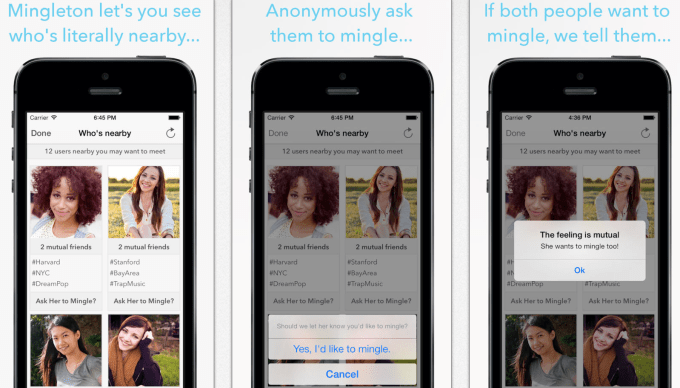How life changes in the 21st century. Spy a nice looking stranger in a bar and kick-start the dating game. This is the ultimate in instant gratification.
The only question is: should there be a ping locator for the diamond on the finger (it is best rejected as an oppressive symbol of patriarchy, also it costs too much).
 .....
.....
A startup called Mingleton is introducing a new mobile dating application that uses iBeacon technology to help you connect only with people you can see around you, or, as one of the founders puts it, it’s like Tinder “for the people in your immediate vicinity.” The app doesn’t actually require venues to have iBeacon or Bluetooth Low-Energy (BLE) devices installed in order for this to work, to be clear, but rather leverages Core Bluetooth and Core Location technology in the iPhone itself to help its users find one another out the real world.
The idea of tapping into BLE flips the idea of mobile dating apps on its head. Instead of seeing someone’s picture in the app before trying to find them in the room (damn those group photo shots!), you’re more likely to see them in the flesh first, and then you turn to the app to find their profile and indicate your interest.
Mingleton actually started out as a side project created by 24-year old Harvard grads, Obi Ekekezie and Joel Ayala. Ekekezie was pre-med at Harvard, but went to work in management consulting with Bain & Company in San Francisco after graduation, before returning to interview for medical school and pursue his longtime interest in programming. Ayala’s background is in finance, and he’s worked at Goldman Sachs and Citigroup in the past, and is now doing corporate strategy and finance in the ad tech space.
Asked to explain how the technology works in more detail, Ekekezie said users would sign up with Facebook before being assigned a unique beacon configuration. “When another user detects your beacon configuration and then taps ‘See Who’s Nearby’ to see who it is, he or she pings our server to figure out who you are and if you’re relevant to him or her based on both of your stated preferences – for now just gender and age range,” he says. In other words, Mingleton is still showing relevant users based on Facebook data, at least for now. If a potential match, the app then allows the user to view your mutual friends and the hashtags on their profile.
“From there, he or she can decide whether to ask you to mingle,” says Ekekezie. “If and only if you both express interest in mingling, we let you both know.”
Mingleton is a free download here on iTunes.
....
regards
The only question is: should there be a ping locator for the diamond on the finger (it is best rejected as an oppressive symbol of patriarchy, also it costs too much).

A startup called Mingleton is introducing a new mobile dating application that uses iBeacon technology to help you connect only with people you can see around you, or, as one of the founders puts it, it’s like Tinder “for the people in your immediate vicinity.” The app doesn’t actually require venues to have iBeacon or Bluetooth Low-Energy (BLE) devices installed in order for this to work, to be clear, but rather leverages Core Bluetooth and Core Location technology in the iPhone itself to help its users find one another out the real world.
The idea of tapping into BLE flips the idea of mobile dating apps on its head. Instead of seeing someone’s picture in the app before trying to find them in the room (damn those group photo shots!), you’re more likely to see them in the flesh first, and then you turn to the app to find their profile and indicate your interest.
Mingleton actually started out as a side project created by 24-year old Harvard grads, Obi Ekekezie and Joel Ayala. Ekekezie was pre-med at Harvard, but went to work in management consulting with Bain & Company in San Francisco after graduation, before returning to interview for medical school and pursue his longtime interest in programming. Ayala’s background is in finance, and he’s worked at Goldman Sachs and Citigroup in the past, and is now doing corporate strategy and finance in the ad tech space.
Asked to explain how the technology works in more detail, Ekekezie said users would sign up with Facebook before being assigned a unique beacon configuration. “When another user detects your beacon configuration and then taps ‘See Who’s Nearby’ to see who it is, he or she pings our server to figure out who you are and if you’re relevant to him or her based on both of your stated preferences – for now just gender and age range,” he says. In other words, Mingleton is still showing relevant users based on Facebook data, at least for now. If a potential match, the app then allows the user to view your mutual friends and the hashtags on their profile.
“From there, he or she can decide whether to ask you to mingle,” says Ekekezie. “If and only if you both express interest in mingling, we let you both know.”
Mingleton is a free download here on iTunes.
....
regards
No comments:
Post a Comment